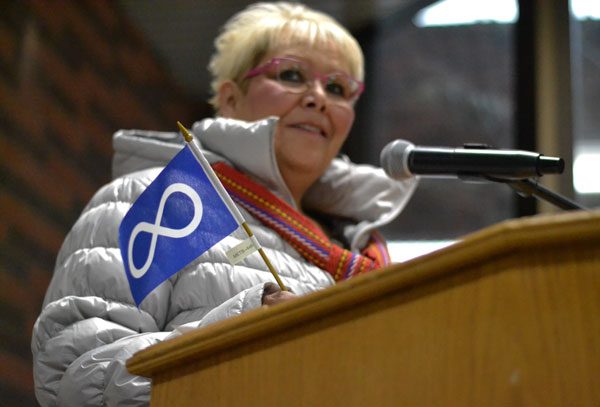
A local representative for the Métis Nation of Saskatchewan (MN-S) has thrown her support behind a proposed back alley curfew bylaw that would see residents fined for being in a back alley between midnight and 6 a.m. without an appropriate reason.
Sherry McLennan, the Minister for Batoche and area director for MN-S Western Region Two said Prince Albert residents of all ethnicities feel back alleys are unsafe. On Thursday, she applauded city council for taking steps to address that issue by passing the first two readings of a back alley access bylaw.
“It’s pretty scary in back alleys, and probably more so now as our society has changed over the years,” she said. “When I was younger and I was a single mom and lived in the West Flat it was scary, but not as scary as it is now with the gang activity, with people getting shot, getting stabbed, and this is not a racial thing. It can be anybody.”
McLennan was raised in the West Flat, but as an adult she chose to live in a different part of Prince Albert, largely so she could avoid those back alleys. Her current home doesn’t have one, which is the biggest reasons she decided to live there.
“It makes a total difference in the safety I feel,” she said. “It’s just the front I have to watch. I don’t have to watch the back anymore.”
Opponents of the city’s proposed bylaw say it will lead to increased racial profiling and discrimination, but McLennan remains unconvinced. She said there’s still a lot of activity in Prince Albert back alleys, and it’s causing vulnerable residents, like seniors and single moms, to feel unsafe.
“It’s a safety concern for all citizens,” she said. “We have a lot of elders who live in their own places and I think they would feel a lot safer. To me, it’s not a racial concern.”
McLennan said she’s satisfied the bylaw contains enough protection for residents like shift workers who need access to their back alleys at night. She also said she supporters Prince Albert police, and believes they will enforce the bylaw in a just and professional manner.
Opponents have argued that the bylaw will be ineffective at reducing crime in back alleys, and McLennan acknowledged that may be the case. However, she’s open to trying it, since crime is such a large problem.
“We don’t want to make it a race thing. We want it to be a safety thing,” she said. “We want to support our police, because we know they’re so busy. Hopefully this bylaw will help them a little bit. All we can do is try.”
The back alley curfew bylaw passed two readings at the last city council meeting on April 27. Council declined to vote on the third reading at the request of the Prince Albert Grand Council. The PAGC is concerned the bylaw could lead to carding and racial profiling, and asked to meet with the city officials to discuss their concerns. After the meeting, mayor Greg Dionne said the bylaw would be back on the agenda before the end of May.
Métis Nation of Saskatchewan represents the political, socioeconomic, cultural and educational interests of roughly 80,000 Métis citizens in Saskatchewan. Western Region Two represents MN-S locals in Prince Albert, Batoche, Big River, Debden, Duck Lake, Fish Lake, Kinistino, Leask, Lily Plain, MacDowall, Nordale, Sask Rivers, St. Louis, Shell Lake and Timberland.

